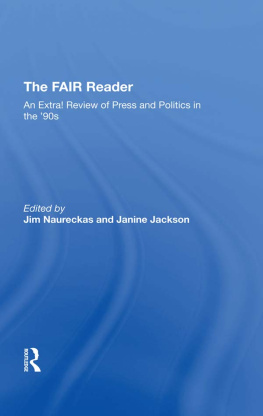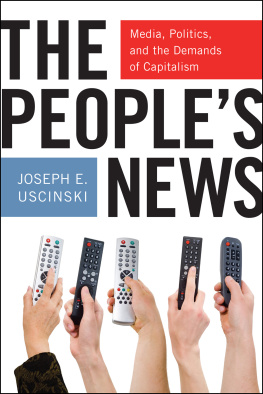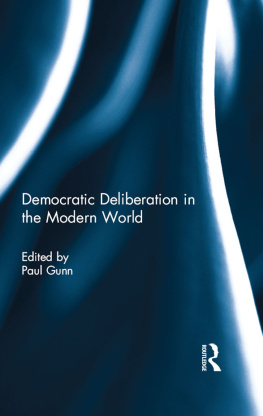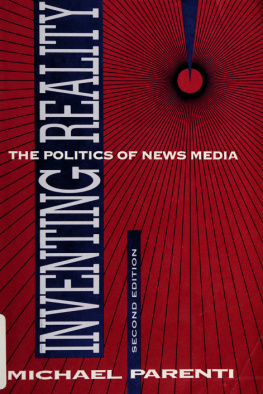The FAIR Header
Critical Studies in Communication and in the Cultural Industries
Herbert I. Schiller, Series Editor
The FAIR Reader: An EXTRA! Review of Press and Politics in the 90s, edited by Jim Naureckas and Janine Jackson
Communication and the Transformation of Economics: Essays in Information, Public Policy, and Political Economy, Robert E. Babe
A Different Road Taken: Profiles in Critical Communication, edited by John A. Lent
Consumer Culture and TV Programming, Robin Andersen
Marketing Madness: A Survival Guide for a Consumer Society, Michael F. Jacobson and Laurie Anne Mazur
Public Television for Sale: Media, the Market, and the Public Sphere, William Hoynes
Counterclockwise: Perspectives on Communication, Dallas Smythe (edited by Thomas Guback)
The Panoptic Sort: A Political Economy of Personal Information, Oscar H. Gandy, Jr.
Triumph of the Image: The Medias War in the Persian GulfA Global Perspective, edited by Hamid Mowlana, George Gerbner, and Herbert I. Schiller
The Persian Gulf TV War, Douglas Kellner
Mass Communications and American Empire, Second Edition, Updated, Herbert I. Schiller
Forthcoming
Monopoly Television: MTVs Quest to Control the Music, Jack Banks
Invisible Crises, edited by George Gerbner, Hamid Mowlana, and Herbert I. Schiller
Introduction to Media Studies, edited by Stuart Ewen, Elizabeth Ewen, Serafina Bathrick, and Andrew Mattson
The Communications Industry in the American Economy, Thomas Guback
The Social Uses of Photography: Images in the Age of Reproducibility, Hanno Hardt
Ideology, Government Broadcasting, and Global Change, Laurien Alexandre
Hot Shots: An Alternative Video Production Handbook, Tami Gold and Kelly Anderson
First published 1996 by Westview Press
Published 2019 by Routledge
52 Vanderbilt Avenue, New York, NY 10017
2 Park Square, Milton Park, Abingdon, Oxon OX14 4RN
Routledge is an imprint of the Taylor & Francis Group, an informa business
Copyright 1996 Taylor & Francis
All rights reserved. No part of this book may be reprinted or reproduced or utilised in any form or by any electronic, mechanical, or other means, now known or hereafter invented, including photocopying and recording, or in any information storage or retrieval system, without permissionin writing from the publishers.
Notice:
Product or corporate names may be trademarks or registered trademarks, and are used only for identification and explanation without intent to infringe.
Library of Congress Cataloging-in-Publication Data
The FAIR reader : an Extra! review of press and politics in the 90s /
edited by Jim Naureckas and Janine Jackson.
p. cm. (Critical studies in communication and in the
cultural industries)
Articles appeared originally in Extra! or Extra! update.
Includes bibliographical references and index.
1. Press and politicsUnited States. 2. Mass mediaUnited
States Objectivity. 3. Reporters and reporting United States.
4. United StatesPolitics and government 1989- I. Naureckas,
Jim. II. Jackson, Janine. III. Extra! (New York, N.Y. : 1987)
IV. Series.
PN4888.P6F35 1996
302.230973dc20
95-45758
CIP
ISBN 13: 978-0-367-29205-8 (hbk)
To Lauren, Sean, Caitlin, and Patrick: Dont believe everything you read .
J.N.
Contents
JIM NAURECKAS AND JANINE JACKSON
WILLIAM GIBSON
DOUG HENWOOD
MARK COOK & JEFF COHEN
JIM NAURECKAS
JIM NAURECKAS
SAM HUSSEINI
JOSHUA MEYROWITZ
JANINE JACKSON
LAWRENCE SOLEY
JIM NAURECKAS
JIM NAURECKAS
JUSTIN LEWIS & MICHAEL MORGAN
JIM NAURECKAS
JANINE JACKSON
STEVE COBBLE
TIFFANY DEVITT & JANINE JACKSON
DOROTHEE BENZ
JIM NAURECKAS
JIM NAURECKAS
JIM NAURECKAS
JEFF COHEN & NORMAN SOLOMON
VEENA CABREROS-SUD & FARAH KATHWARI
ROB RICHIE & JIM NAURECKAS
JEFF COHEN & NORMAN SOLOMON
LAURA FLANDERS
JOHN SUMMA & PATRICE GREANVILLE
DEAN BAKER
ROBERT DREYFUSS
JOHN CANHAM-CLYNE
JIM NAURECKAS
JIM NAURECKAS
JANINE JACKSON
RENU NAHATA
MIKE MALES
JANINE JACKSON & JIM NAURECKAS
JANINE JACKSON
JIM NAURECKAS
JOHN HESS
DOUG HENWOOD
DAN SHADOAN
KIM DETERLINE
JIM NAURECKAS
Guide
Thanks are due to all the contributors to Extra! and to the staff and interns of FAIR. Among those who provided invaluable help were Jim Levendos, Gabi Meja, and especially Angela Littwin and Rebecca Brown.
We are grateful to all who helped us review the manuscript, especially Geralyn Byers, Jeff Cohen, Carolyn Francis, Doug Henwood, Sam Husseini, Mike Males, Kathleen Naureckas, Steven Rendali, and Norman Solomon.
Editors Note
These articles originally appeared in the magazine Extra! (or in Extra! Update , its companion newsletter). They have been edited for publication in this book, with some minor corrections and style changes. Tenses have been changed to reflect the passage of time.
Jim Naureckas and Janine Jackson
T HINGS WERE SIMPLER in the 80s.
Throughout most of that decade, the view of the world presented in mass media accounts closely resembled the vision of reality put forward by official Washington. Books like Edward Herman and Noam Chomskys Manufacturing Consent , Martin Lee and Norman Solomons Unreliable Sources , and Michael Parents Inventing Reality documented a press corps that was more than willing to bend the facts to suit the reigning ideology of the Reagan and Bush administrations.
In the 1990s, the relationship between press and state has gotten more complicated. George Bush, lionized by the media during the Gulf War, ended up a year later bashing the presspromoting bumper stickers that read, Annoy the Media/Vote Bush. Journalists singled out Bill Clinton as destined for victory in the race for the 1992 Democratic presidential nomination, and they shaped primary coverage to make this a self-fulfilling prophecybut they also singled out Clinton for unprecedented focus on personal scandal, dredging up decades-old allegations of sexual infidelity and draft-dodging.
The love-hate relationship between Clinton and the media continued into his term in office. Pundits praised his leadership on issues like deficit reduction and trade, while savaging him on his attempt to lift the military ban on gays and on several of his high-level nominations. His health care reform proposals were first praised, then savaged. Whereas the press had rallied around Reagan-Bush era interventions in Grenada, Panama, and Iraq, Clintons use of military force in Somalia and Haiti became the focus of intense scrutiny and debate.
Whats the explanation for these seeming paradoxes? The essays, studies, and investigative reports in this bookarticles that originally appeared in Extra! and Extra! Update , the publications of the media watch group FAIR (Fairness & Accuracy In Reporting)attempt to provide an answer.







